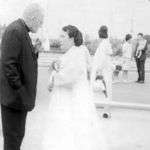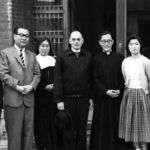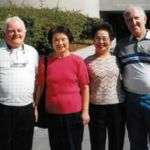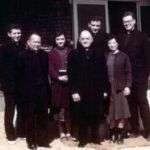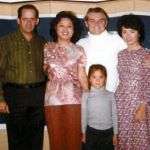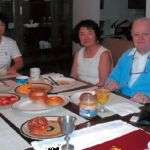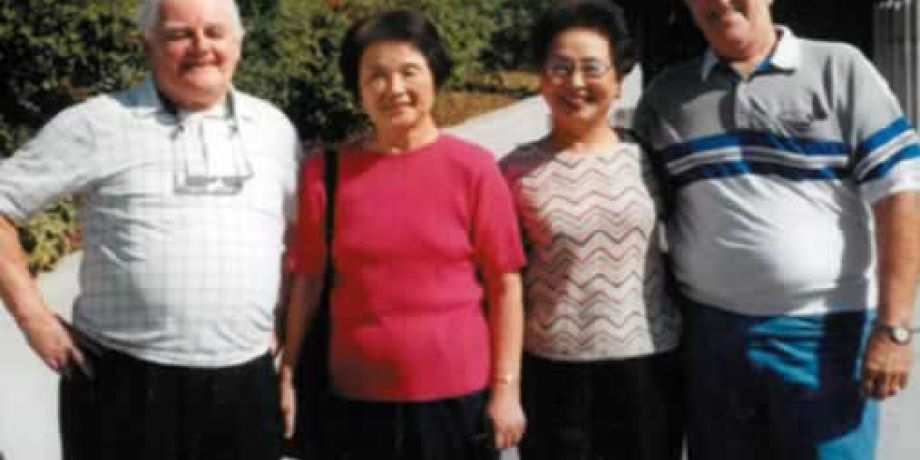
The Household of God
I met the Columban Fathers for the first time in my hometown, Seoul, during the summer of 1953. Korea was at war then. Amid destruction and the chaos of war, I was trying to leave home for a college in America. As the oldest of five children of a widow, apart from the promise of a full scholarship, the friendship of a U.S. Air Force chaplain, and the rash enthusiasm of youth, I had little else going for me.
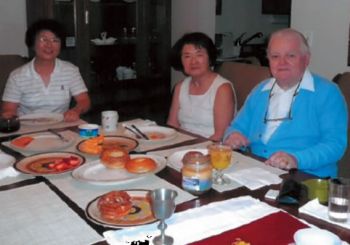
and Fr. Sean Dunne
The South Korean government was still based in the city of Busan at the southern tip of the country, where it had fled three years before when the North Korean army invaded the capital, Seoul. With the infrastructure demolished and the communication system in shambles, there was no radio, newspaper or phone. We were living in a nationwide information blackout.
How was I to secure a passport and visa against such impossible odds? While I struggled with this matter, my Air Force chaplain friend, Fr. William McPeak, quietly went about gathering the information I needed. He informed me that I had to pass two English tests – one given by the Ministry of Foreign Affairs and the other by the U.S. Embassy – as well as a Korean history test administered by the Ministry of Education. There still remained, however, so much that was unknown regarding my passport and visa application since there was no single information center. Seemingly, each Ministry had its own requirements which it refused to divulge until the very last, desperate minute.
Today I realize that there was a logic to the madness of that system. Mortally wounded and bankrupt, the South Korean government was unable to pay the wages of its employees. It turned a blind eye, therefore, as they did their best to survive by fleecing those trying to travel overseas. Their thinking was that anyone who could afford to travel while the entire nation was starving, could surely grease the palm of a poor government official. My family, however, could hardly afford two meals a day.
What was I to do? Fr. McPeak decided that I should visit the headquarters of the Columban Fathers in Seoul. After all, Fr. Brian Geraghty, the superior, had already been in Korea for twenty years. If anyone could help this poor girl, Fr. McPeak considered, surely this man could.
It was a bright sunny afternoon when I climbed into the passenger seat of Fr. McPeak's jeep. Obviously no stranger to the Columban House, the priest in military uniform honked in front of a huge, imposing wooden door. It was swung open by a young lad who recognized the driver and stepped back to allow us to enter.
Obviously expected, by the time Fr. McPeak got down from the jeep several priests emerged from the house. Warm and welcoming, my friend in khaki was quickly surrounded by his friends in black soutanes. Joyful to be together, everyone was laughing, back-slapping and talking at the same time. They were like a bunch of high school boys!
I stood back and watched in shock. A cradle Catholic, I had seen priests all my life, but I didn't remember ever seeing a priest laugh. Not a polite anemic smile, but a real hearty laugh. There was nothing solemn or dignified about them. They behaved like normal human beings! As I drank in the scene, I liked what I saw, and it slowly dawned on me that it was all right for Christians to laugh and be truly happy.
Fr. Geraghty was a gold-mine of information. I would have to go to Busan to take the Ministry of Foreign Affairs' English test. However, as far as he knew, there was no published schedule date for the test, so he didn't know when the next one would be. There was just one train a day that ran from Seoul to Busan and back again. With the frequent talks of peace at Panmoonjom, there was a rumor that some of the branches of the government would soon relocate from Busan back to Seoul. This speculation only compounded my confusion.
With the tenacious help of Fr. McPeak, I managed to arrive at the College of St. Francis in Illinois in time to start my freshman year. My friendship with Fr. Geraghty endured to the end of his life some twenty years later. Since I had lost my father when I was thirteen, despite his gruff exterior, I found in Fr. Geraghty the tenderness of a father that I had sorely missed.
Whenever I recall Fr. Geraghty I think also of his friend, Fr. Pat Dawson. Often when I called to the Columban house, I would spy neighborhood children hanging around the door. They were waiting for Fr. Dawson, their "big-nosed" playmate. I never understood Fr. Dawson, either in English because of his heavy Irish accent, or in Korean, because he spoke the Jeju dialect, which I didn't understand. However, there was no mistaking his beaming smile on his guileless face, which invariably spread gaiety and joy wherever he went.
Back again in Seoul after my studies some years later, my work at the Catholic Relief Services brought me into contact with many Columbans in Korea. I met Fr. Sean Anthony Dunne who needed assistance with the script of a movie. Through my visits to him I met Columban Fr. Phil Crosbie.
Once or twice, my assignment also took me to the city of Chunchon where I received the warm, gracious hospitality of Columban Bishop Tom Quinlan. Whenever I encountered this gentle giant, it made me wonder how a person could remain so unfailingly gentle and kind to others even after the cruel treatment he suffered during the Korean War "death march" that had killed many stronger and younger persons.
The most pastoral of all the bishops in Korea, Columban Archbishop Harold Henry, was instrumental in my becoming a Poor Clare nun. After spending seven years in the Poor Clare convent in Minneapolis, another Sister and I visited him in his diocese in the city of Kwange. He had purchased a ten-acre property for our convent. However, shortly before our visit, he was notified by city hall that it had road plans that involved our property, which would result in it being carved into nine pieces. Obviously, we had to consider an alternative plan.
The Archbishop's assistant suggested that we visit Jeju Island and consider looking for a suitable site for our new convent there. I balked. Why would anyone want to build a convent there? Jeju had long been associated with those who had been sent into exile as a result of having incurred the wrath of the reigning king. To go to Jeju island was to be banished!
I boarded the plane, resenting the unconcealed enthusiasm of my companion who was delighted to finally visit the island she had only read about in history books.
Upon arrival, Columban Fr. Johnny Dunne welcomed us with warm Irish hospitality. I immediately asked him if there was a suitable site for a convent there. "I don't know. You had better ask P.J." was his only response. "Was there any way that a community of nuns could support themselves? Could he suggest how we could making a living on the island?" "Don't know; best ask P.J." was his reply again.
So we seemed fated to meet Columban Fr. P.J. McGlinchey whom I had occasionally exchanged greetings with at the Catholic Relief Service office in Seoul. Would he remember me, I wondered. Was he home for us to meet him? Fr. Dunne gave me a sly smile. "Ach, even God almighty doesn't know P.J.'s whereabouts. It's a secret known only to P.J. and his guardian angel." Fr. Dunne suggested that we spend the night at his rectory, but that we had better leave early the following tomorrow. "You had better catch him in bed," he counseled.
Rising at the crack of the dawn, after a hasty breakfast the two of us climbed into the jeep and were driven to Fr. McGlinchey's place. The hill leading up to Hallim where our legendary priest resided was the bumpiest, wildest ride I have ever had, either before or since! Washed by rivulets of water for many years, the red clay hill was marked by deep gashes and grooves and huge rocks protruded everywhere.
"Yes, Fr. McGlinchey is home," the startled housekeeper answered. None too pleased by our untimely arrival, the young woman's nose rose a fraction in the air as she went to call him.
Obviously just out of bed, our host with uncombed hair approached us and drawled, "Well, Theresa. What fair wind brings you here?" I told him why we had come. My response had a strange effect on our host, however, because he suddenly burst out laughing. As I watched in stunned bewilderment, Fr. McGlinchey explained that he had been praying to God to send him contemplative religious to build a spiritual power house there on the island. "But, you see, I had been asking God for monks, not nuns!" he added with a chuckle. Then, the following day during one of his unguarded moments, he confessed, "Nuns are a pain! One has to be a fool to have them in his backyard."
However, Fr. McGlinchey was no fool! Rather he was an unassuming man with deep faith, because once he was convinced that we were there in answer to his prayer, he spared no effort or time to help us. Thanks to the Lord's providence in all these matters, that was how the first Poor Clare community came to be on Jeju Island—though not in Fr. McGlinchey's backyard, but rather a field away from his rectory! Certainly, without Archbishop Henry's initiative and Fr. McGlinchey's tireless help, there would be no convent there today.
The decades keep rolling by! In May of last year I was invited to the blessing of the Columban Martyrs' Memorial Garden on the grounds of their U.S. headquarters outside Omaha. Since I could not be there because of a previous commitment, I had promised myself a visit in the fall. At the airport, I was met by Kim Balkovec, a Columban co-worker. As I followed her to her car, I already felt that sense of Columban welcome and hospitality.
Later that afternoon I met Fr. Tim Mulroy, the Director of the U.S. Region. Even though I was meeting him and the other members of the community there for the first time, it felt like a reunion of old friends or long lost brothers.
Indeed, wherever I meet them, the Columban Fathers they are no strangers to me because I have known them for more than half a century. Whether in Korea or here in the U.S., I have always felt part of their extended family, members of the same household of God.
Born and raised in Korea, Theresa Lee now resides in Illinois.
